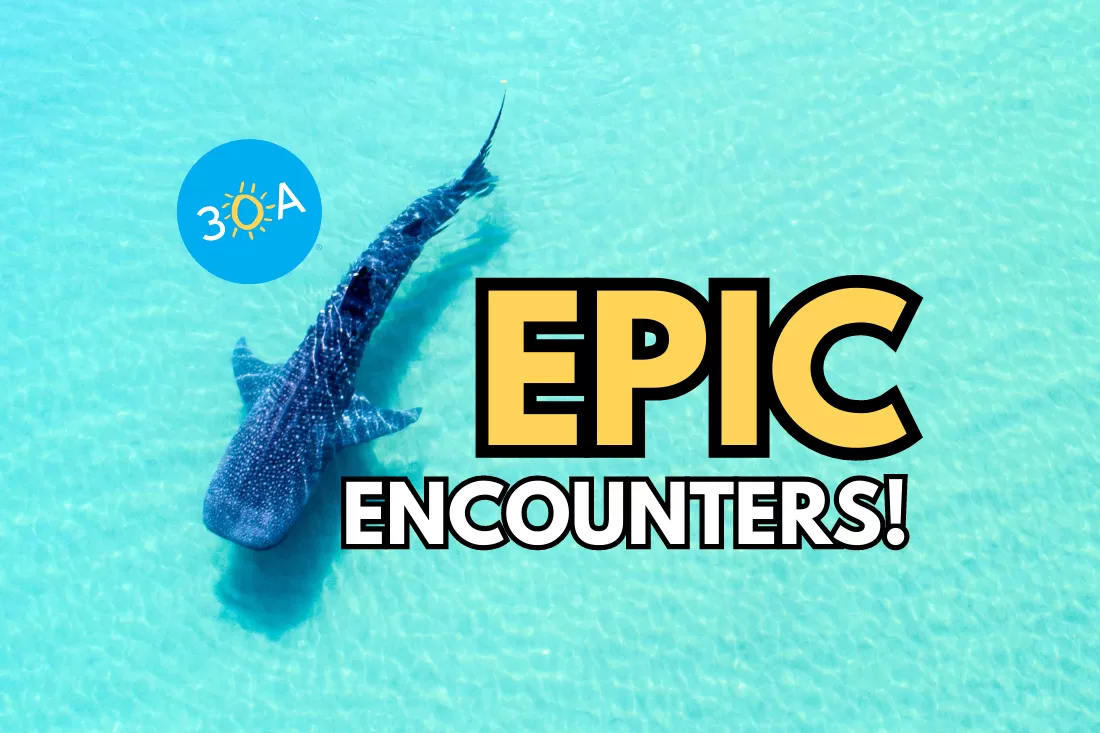VIDEOS: Whale Sharks Spotted Near Destin, Florida
Unveiling the mysteries of whale sharks along the Emerald Coast!
Unveiling the mysteries of whale sharks along the Emerald Coast!

Whale sharks have recently been sighted along our Emerald Coast, drawing a great deal of attention to these magnificent creatures.
Recently, the Coastal Resource team of Destin-Fort Walton Beach Tourism in Okaloosa County teamed up with the National Oceanic and Atmospheric Administration (NOAA), the University of Southern Mississippi, and the fishing community to successfully tag two whale sharks, Ivey and Oliver, in the Gulf of Mexico. This collaborative endeavor was significantly aided by reports from both commercial and recreational fishermen who identified the whale sharks’ location. Ivey, a 25-foot female, and Oliver, a 40-foot male, were each named after children connected to those who sighted them. Both sharks were tagged with a satellite tag for surface detection and an acoustic tag for proximate location data, with biological samples taken for genetic research. Additionally, video footage was captured to confirm each shark’s size, sex, and unique dot pattern, which can be used for future identification.
Later, Alex Fogg, Coastal Resource Manager at Visit Destin-Fort Walton Beach Tourism shared an update on Facebook that eight more whale sharks were tagged off Destin – Fort Walton Beach – Johnny, Tucker, Dotty, Chaos, Lorelai, Dean, Smalls, and Carl.
“We ran out of tags! Hope to get out again next week if there are more kicking around,” wrote Fogg.
The whale shark, or Rhincodon Typus, is not only the largest fish species alive today but also the largest non-mammalian vertebrate. Despite reaching lengths up to 60 feet and weights of 20 metric tons, these colossal creatures feed primarily on microscopic plankton, krill, and small fish. It’s a dietary preference that has aptly earned them the nickname ‘gentle giants.’ Their unique filter-feeding system, rarely seen among sharks, allows them to consume vast amounts of tiny marine organisms.
While whale sharks can be found in warm waters all over the world, every summer, they congregate in large numbers in the Gulf of Mexico, especially near the Yucatan Peninsula.
This seasonal occurrence, from June to September, is one of the largest known aggregations of whale sharks globally and presents an unparalleled opportunity for researchers and eco-tourists alike.
The reason for this annual gathering is still a subject of research, but prevailing theories suggest that it’s likely tied to the area’s rich supply of plankton and fish eggs. One interesting and lesser-known fact about this aggregation is its correlation with the spawning of a little fish called the little tunny, or Euthynnus Alletteratus. When these fish release their eggs into the ocean, it serves as a veritable feast for the filter-feeding whale sharks.
In the grand scheme of life, whale sharks remain a mystery in many ways. They are known to have a lifespan of up to 70 years, possibly even up to 100, yet their breeding habits remain elusive. Only a single pregnant whale shark has ever been studied, found to be carrying around 300 pups – the highest number in any shark species.
Each whale shark has a distinct pattern of spots and stripes on its skin, much like a human fingerprint. Researchers use these patterns to identify individual sharks and track their movements and growth over time, utilizing specialized software that works much like a facial recognition system for humans.
The whale sharks’ presence in the Gulf of Mexico is an incredible natural spectacle and an important part of the marine ecosystem. However, they face numerous threats, including boat collisions and accidental bycatch. Efforts are underway to protect these incredible creatures and to ensure that they continue to grace the Gulf with their presence for years to come.
Do’s:
Don’ts:
Remember, when diving or snorkeling with whale sharks or any other marine life, the goal is to observe and appreciate these animals in their natural habitats without causing them stress or harm. Always prioritize the well-being of the creatures over getting the perfect photograph or having a close encounter.